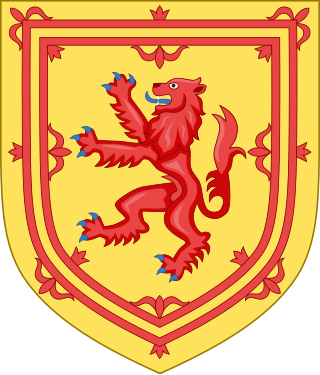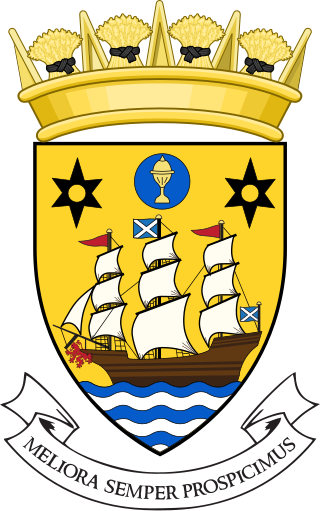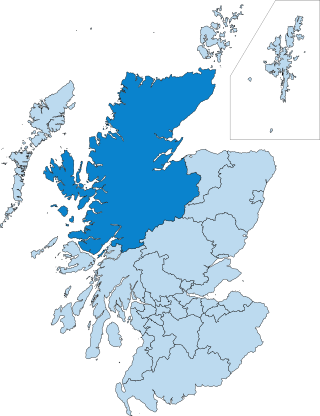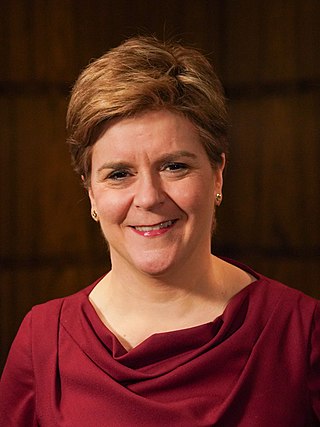
Renfrewshire is one of the 32 council areas of Scotland.

Local government in Scotland comprises thirty-two local authorities, commonly referred to as councils. Each council provides public services, including education, social care, waste management, libraries and planning. Councils receive the majority of their funding from the Scottish Government, but operate independently and are accountable to their local electorates. Councils raise additional income via the Council Tax, a locally variable domestic property tax, and Business rates, a non-domestic property tax.

Inverclyde Council is one of the 32 local authorities of Scotland, covering the Inverclyde council area. In its current form the council was created in 1996, replacing the previous Inverclyde District Council which existed from 1975 to 1996.

Dumbarton is a constituency of the Scottish Parliament (Holyrood) covering parts of the council areas of Argyll and Bute and West Dunbartonshire. It elects one Member of the Scottish Parliament (MSP) by the first past the post method of election. It is also one of ten constituencies in the West Scotland electoral region, which elects seven additional members, in addition to the ten constituency MSPs, to produce a form of proportional representation for the region as a whole.

The politics of the Highland council area in Scotland are evident in the deliberations and decisions of the Highland Council, in elections to the council, and in elections to the House of Commons of the Parliament of the United Kingdom (Westminster) and the Scottish Parliament (Holyrood). In the European Parliament the area was within the Scotland constituency, which covers all of the 32 council areas of Scotland.

Elections to Glasgow City Council were held on 3 May 2007, the same day as the other Scottish local government elections and the Scottish Parliament general election. The election was the first one using 21 new wards created as a result of the Local Governance (Scotland) Act 2004, each ward elected three or four councillors using the single transferable vote system form of proportional representation. The new wards replaced 79 single-member wards which used the plurality system of election. It also saw the election of Glasgow's first councillors for the Scottish Greens and for Solidarity.

Elections to Dundee City Council were held on 3 May 2007, the same day as the other Scottish local government elections and the Scottish Parliament general election.

Elections to Aberdeenshire Council were held on 3 May 2007 the same day as the other Scottish local government elections and the Scottish Parliament general election. The election was the first one using 19 new wards created as a result of the Local Governance (Scotland) Act 2004, each ward would elect three or four councillors using the single transferable vote system form of proportional representation. The new wards replaced 68 single-member wards which used the plurality system of election.
Elections to the Highland Council were held on 3 May 2007; the same day as elections to the Scottish Parliament and to the 31 other councils in Scotland. Previous elections to the council had been conducted using the single member plurality system. Changes implemented by the Local Governance (Scotland) Act 2004 meant that future local government elections were to be conducted using the Single Transferable Vote, beginning with those in 2007. The 80 Highland Councillors were now to be elected from 22 wards, returning either three or four members.
Elections to Argyll and Bute Council were held on 3 May 2007 the same day as the other Scottish local government elections and the Scottish Parliament general election. The election was the first one using 11 new wards created as a result of the Local Governance (Scotland) Act 2004, each ward will elect three or four councillors using the single transferable vote system form of proportional representation. The new wards replace 36 single-member wards which used the plurality system of election.

Elections to Midlothian Council were held on 3 May 2007, the same day as the other Scottish local government elections and the Scottish Parliament general election. The election was the first one using six new wards created as a result of the Local Governance (Scotland) Act 2004. Each ward will elect three or four councillors using the single transferable vote system form of proportional representation. The new wards replace 18 single-member wards which used the plurality system of election.
Elections to Dumfries and Galloway Council were held on 3 May 2007 the same day as the other Scottish local government elections and the Scottish Parliament general election. The election was the first one using 13 new wards created as a result of the Local Governance (Scotland) Act 2004, each ward will elect three or four councillors using the single transferable vote system form of proportional representation. The new wards replace 47 single-member wards which used the plurality system of election.

The 2012 Scottish local elections were held on 3 May 2012 in all 32 local authorities. The Scottish National Party (SNP) overtook Labour to win the highest share of the vote, and retained and strengthened its position as the party with most councillors. Labour also made gains, while the Liberal Democrats experienced meltdown, losing over half their seats and falling behind the Conservatives. For the first time since the introduction of the Single Transferable Vote system, the SNP won majority control of 2 councils, from no overall control. Labour also won majority control of 2 councils from no overall control, while retaining majority control over 2 councils.
Elections to Argyll and Bute Council were held on 3 May 2012 on the same day as the 31 other local authorities in Scotland. The election used the eleven wards created under the Local Governance (Scotland) Act 2004, with 36 councillors being elected. Each ward elected either 3 or 4 members, using the STV electoral system.
Elections to Inverclyde Council were held on 3 May 2012, the same day as the other 31 local authorities in Scotland. The election used the six wards created as a result of the Local Governance (Scotland) Act 2004, with each ward electing three or four Councillors using the single transferable vote system form of proportional representation, with 20 Councillors being elected in total.

The 2017 Scottish local elections were held on Thursday 4 May, in all 32 local authorities. The SNP retained its position as the largest party in terms of votes and councillors, despite suffering minor losses. The Conservatives made gains and displaced Labour as the second largest party, while the Liberal Democrats suffered a net loss of councillors despite increasing their share of the vote. Minor parties and independents polled well; and independent councillors retained majority control over the three island councils. For the first time since the local government reforms in 1995, all mainland councils fell under no overall control.
The 2017 elections to Inverclyde Council were held on Thursday 4 May 2017, on the same day as the 31 other local authorities in Scotland. It was the third successive Local Council election to run under the STV Electoral System. The election used seven wards created under the Local Governance (Scotland) Act 2004, with 22 Councillors being elected, an increase of 2 from 2012 and an additional ward. Each ward elected either 3 or 4 members, using the STV electoral system.

The 2017 Argyll and Bute Council elections took place on 4 May 2017 alongside local elections across Scotland. This was the third local election to take place using the Single Transferable Vote electoral system.

The 2022 Scottish local elections were held on 5 May 2022, as part of the 2022 United Kingdom local elections. All 1,227 seats across all 32 Scottish local authorities were up for election and voter turnout was 44.8%.

Elections to Argyll and Bute Council took place on 5 May 2022 on the same day as the 31 other Scottish local government elections. As with other Scottish council elections, it was held using single transferable vote (STV) – a form of proportional representation – in which multiple candidates are elected in each ward and voters rank candidates in order of preference.













